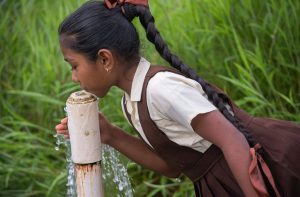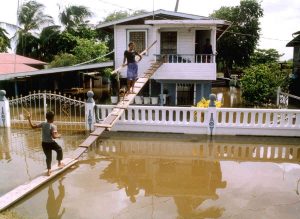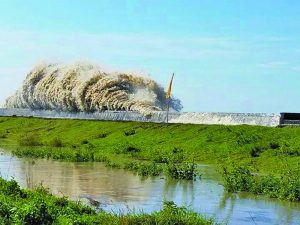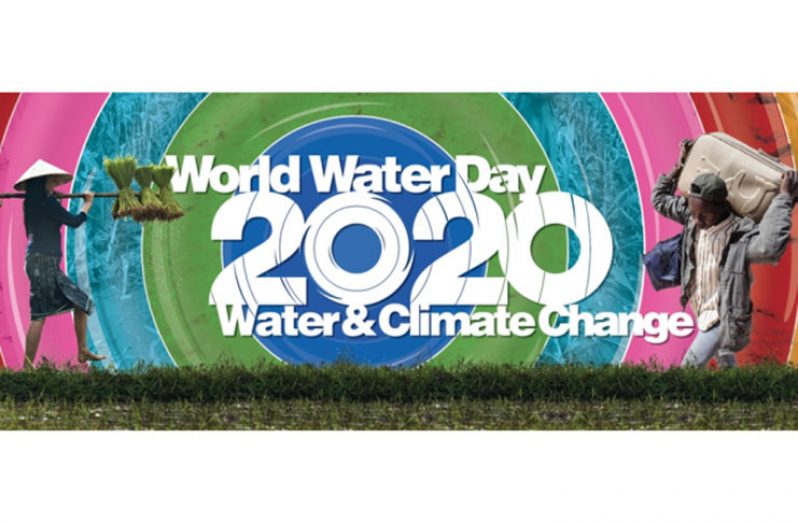WATER is a precondition for life on Earth. Safe drinking water and sanitation are human rights. Water – including sanitation – is critical for socio-economic development, food security and healthy ecosystems, and is vital for reducing the global burden of disease and improving the health, welfare and productivity of populations.
 The science is clear: the global climate change crisis is increasing variability in the water cycle, thus reducing the predictability of water availability and demand, affecting water quality, exacerbating water scarcity and threatening sustainable development worldwide. These impacts disproportionately affect poor and vulnerable communities and are compounded by contributing factors, including population increase, unmanaged migration, land-use change, reduced soil health, accelerated groundwater extraction, widespread ecological degradation and biodiversity loss.
The science is clear: the global climate change crisis is increasing variability in the water cycle, thus reducing the predictability of water availability and demand, affecting water quality, exacerbating water scarcity and threatening sustainable development worldwide. These impacts disproportionately affect poor and vulnerable communities and are compounded by contributing factors, including population increase, unmanaged migration, land-use change, reduced soil health, accelerated groundwater extraction, widespread ecological degradation and biodiversity loss.
Guyana is particularly vulnerable to climate change given its geographic, economic and population dynamics, which can pose challenges to effectively adapt to or mitigate impacts of climate change as was witnessed in 2005. This is compounded by the important role that agriculture, a sector likely to be severely affected by water availability and quality, plays in Guyana’s economy. While all ten (10) administrative regions in Guyana are affected, the impacts of climate change are highly variable and uneven. Some regions have experienced periods of drought, others increasingly severe and frequent floods, while some face both sets of extremes.
 Slower-onset impacts derived from accelerated sea-level rise affect Guyana’s coastal areas where the majority of Guyana’s population and centres of commerce and government are located. At the same time, increased demand for water for energy, agriculture, industry and human consumption is leading to gradually more difficult trade-offs for this limited and precious resource, especially in areas in Guyana that are already facing water stress. For these reasons, it is often said that climate change is felt most directly through water.
Slower-onset impacts derived from accelerated sea-level rise affect Guyana’s coastal areas where the majority of Guyana’s population and centres of commerce and government are located. At the same time, increased demand for water for energy, agriculture, industry and human consumption is leading to gradually more difficult trade-offs for this limited and precious resource, especially in areas in Guyana that are already facing water stress. For these reasons, it is often said that climate change is felt most directly through water.
Water management must play a central role in adapting to the worst effects of climate change and reducing greenhouse gases, according to a new UN-Water Policy Brief. The way we manage water resources can help us tackle climate change in two ways,” says Mr Gilbert F. Houngbo, Chair of UN-Water and President of the International Fund for Agricultural Development (IFAD): “First, by coordinating across sectors we can reduce the impacts of floods and droughts, adapt to the expected increase in unpredictability and ensure communities and businesses have the water they need to thrive. And second, we can reduce harmful emissions by making water supply more sustainable.”
Water, climate change, and single-use plastics
 Plastics are primarily made of petro-chemicals (from fossil fuels), the production of which contributes to climate change as we know it. The global community has recognised with climate change and increased water use and disposing said items which will be in the environment for hundreds of years. In this vein, Guyana and many countries and cities around the world have decided to place a ban on selected single-use plastic items, which once embraced fully and enforced will see a reduction in greenhouse gas emissions, water use for manufacturing, and SUPs as litter.
Plastics are primarily made of petro-chemicals (from fossil fuels), the production of which contributes to climate change as we know it. The global community has recognised with climate change and increased water use and disposing said items which will be in the environment for hundreds of years. In this vein, Guyana and many countries and cities around the world have decided to place a ban on selected single-use plastic items, which once embraced fully and enforced will see a reduction in greenhouse gas emissions, water use for manufacturing, and SUPs as litter.
You can share your ideas and questions by sending letters to: “Our Earth, Our Environment”, C/O Communications Department, Environmental Protection Agency, Ganges Street, Sophia, GEORGETOWN, or email us at eit.epaguyana@gmail.com or follow us on Facebook, Instagram, and YouTube.




.png)









